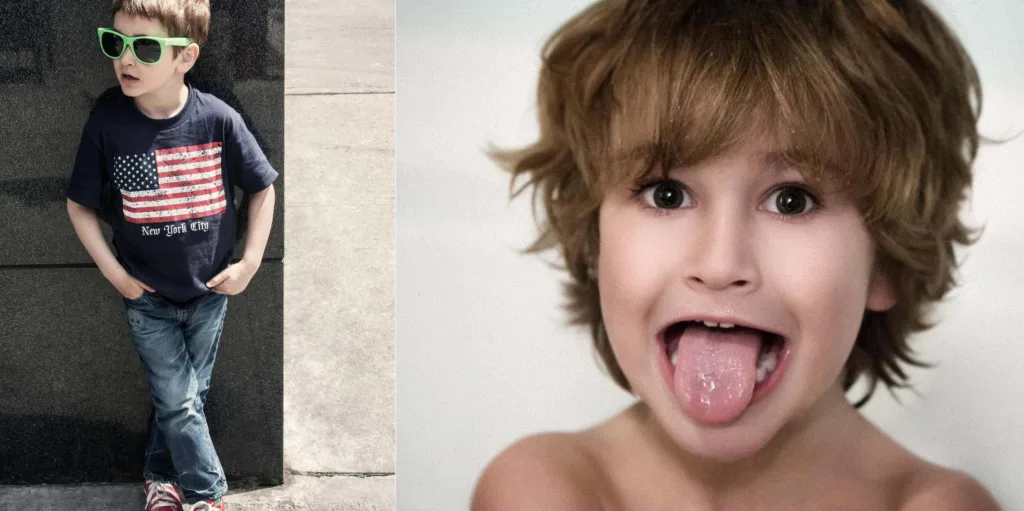I say it all the time—to clients, to friends, and in blog posts on my website: photography is art.
But unlike a landscape watercolor or an abstract sculpture, portrait photography is more complex. It’s not just a collaboration; it’s a conversation between the photographer and the subject and this is where things get interesting.
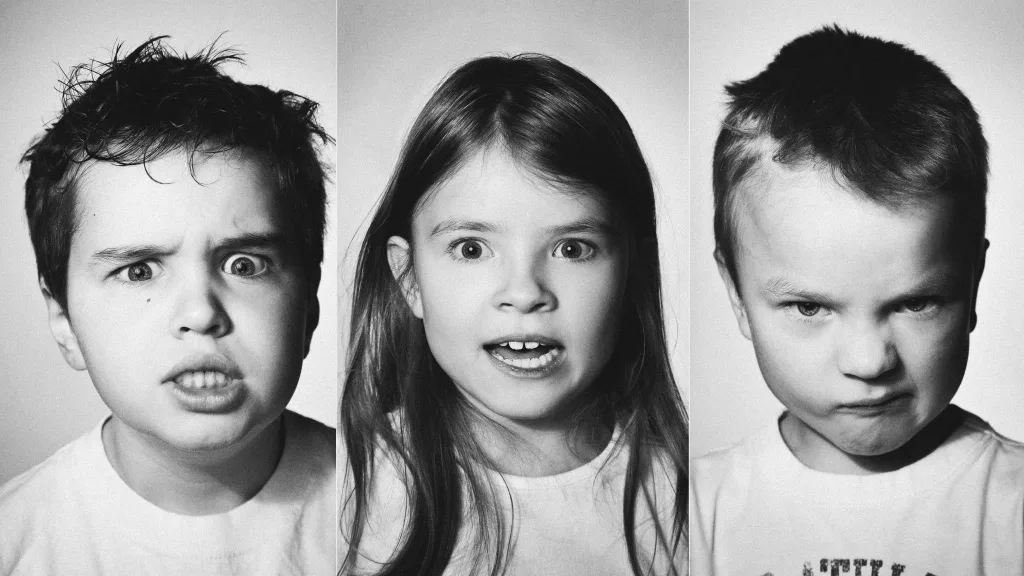
4-6 year olds asked to make an adult facial expressions, my son Max is on the left. Posted with parental and subject consent.
I first began to think seriously about the potential for conflict between a photographer and the subject when I started my photography business in the US. Having just arrived in the US from Europe, my portfolio consisted entirely of fashion photography. I didn’t have a single family portrait to show prospective clients. But I did have something else, a huge archive of portraits of my two favorite models, my two sons.
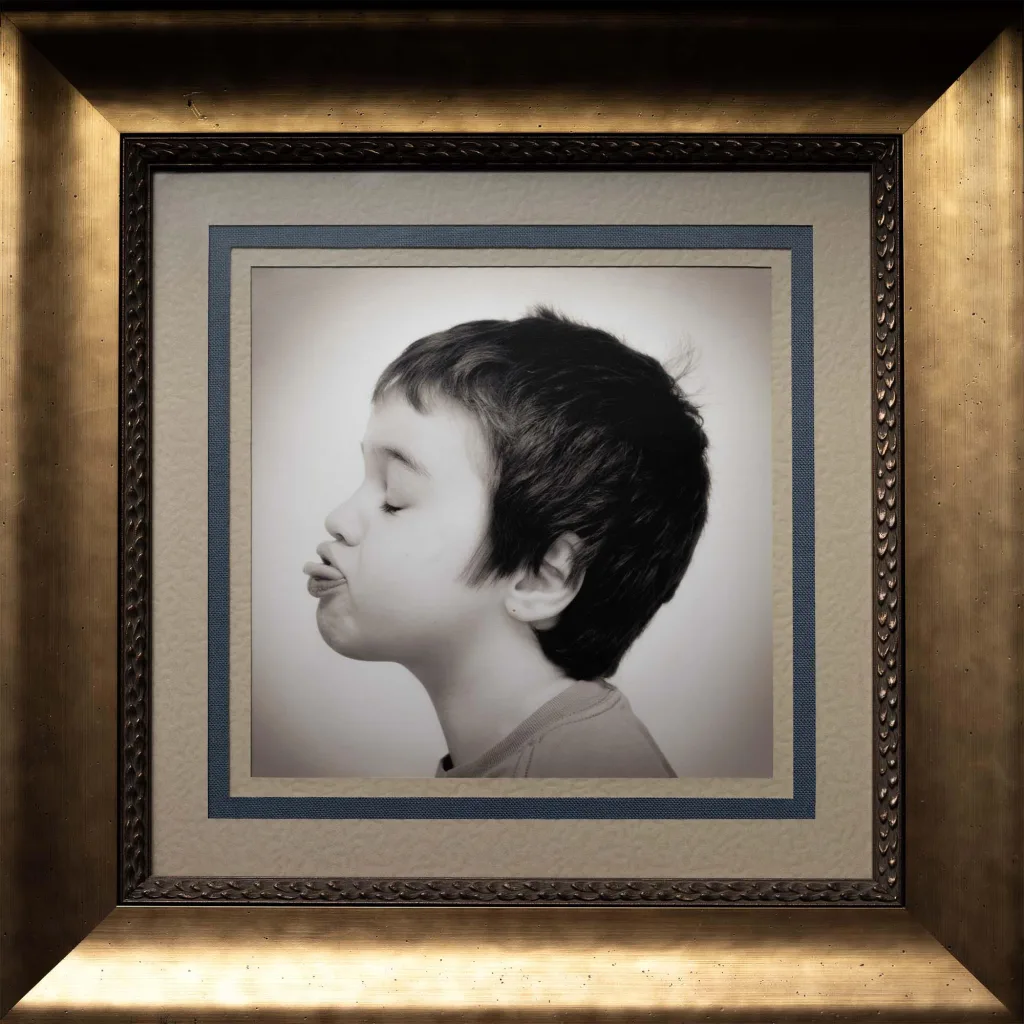
2007: An accidental photo of my son Max making a goofy face.
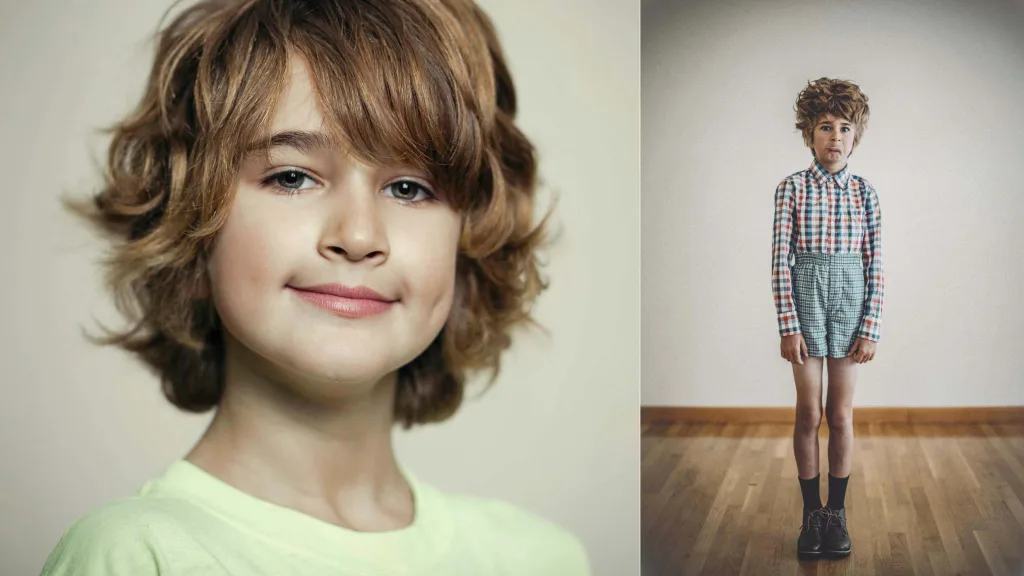
2017: My son Marc posing thoughtfully for a portrait session.
At first, they did not mind that I used their portraits to launch my photography business. After all, they are “photographer’s kids,” which means they were constantly being photographed.
They were my go-to models whenever I was testing new lighting setups, scouting locations, or exploring a creative portraiture idea. But as they got older, everything changed, quickly and unexpectedly. As they grew older, they got on social media, and the rules for our ongoing and past collaboration changed. For their generation, public-facing photographs are a part of their brand, the way they present themselves to the world.
They started asking me to remove certain childhood portraits from my website and Instagram.
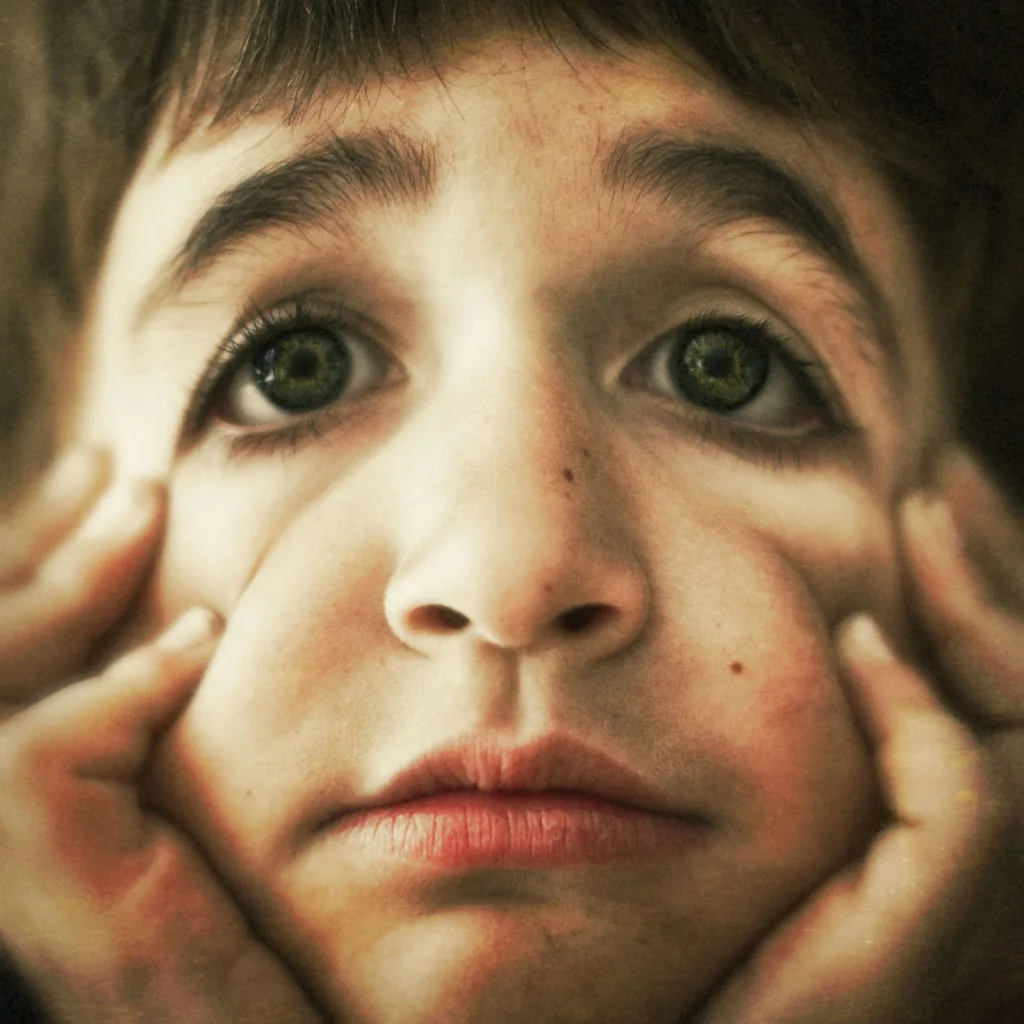
2018: Marc making a funny face during a family photo shoot.

2017: part of a shoot of Max and his then-girlfriend.
Legally, I didn’t have to comply. I owned the copyright to the photographs. They were minors. I had parental consent. But ethically, as their father, I never doubted that they had the right to control their public image.
The Lanier v. Harvard Case
This debate is at the center of some of the most morally complex photography lawsuits.
In 2019, I came across a news story about one of the most morally disturbing and heartbreaking cases of a photographer’s ethical violations of the subjects’ privacy, story, and rights. It’s a story of dehumanization through photography, the Lanier v. Harvard case.
In the 1850s, a white supremacist Harvard professor, Louis Agassiz, commissioned daguerreotypes of two enslaved people, Renty Taylor and his daughter, Delia. The photos, taken without consent, under coercive circumstances as a part of a racist project, were aimed at “proving” white superiority.
This historical photograph is so demeaning that I find it painful to look at. So much so that I can’t bring myself to post the photograph here. If you want to see it, you can easily find it online.
In 2019, Renty and Delia’s descendant, Tamara Lanier, sued Harvard University, which was the legal owner of the image. Ms. Lanier asked Harvard to surrender their rights to the image, arguing that the University has no moral right to use the photos, much less to profit from their publication and display .
Initially, the court in Massachusetts ruled in favor of Harvard, citing the fact that the University was the legal owner of the daguerreotype plates, and there was no contract or any other agreement transferring ownership to anyone else. Lanier appealed and the case was settled this year. Ms. Lanier achieved a moral victory, and the images were transferred to the International African American Museum in South Carolina.
When Art Imitates Legal Life: The Good Wife and Facebook Fiction
The conflict between the photographer and their subject inspired the episode of the TV show “The Good Wife.”
In one of the episodes, a teenage boy sues his mother, a professional photographer, over her right to display his nude childhood images. The photos were included in her gallery show. The fictionalized plaintiff asked the court to compel his mother to remove the pictures from the exhibition. In the episode, the court rules in favor of the mother, citing her copyright and noting that the son was a minor and she had the parental consent rights at the time the photos were taken.
I suspect that the TV show episode appears to be loosely based on the now-debunked 2016 story about a young woman allegedly suing her parents for posting hundreds of her childhood photos on Facebook, as well as two real precedent-setting cases.
The story of an 18-year-old Austrian woman who allegedly sued her parents for posting and keeping her childhood photos on their Facebook page, even after she repeatedly asked her parents to have the photos taken down. The story was so persuasive that major news outlets ran it. Although the story turned out to be fake, it struck a nerve.
It put a spotlight on parents oversharing their kids’ photos online without considering the issues of consent and privacy involved in the publication of such images.
Issues of privacy and subjects’ rights were played out not only in TV shows and fake news stories, but also in many real court cases in many different countries. The rulings vary from country to country, and what I find most fascinating is that courts in different countries ruling in separate cases can reach diametrically opposite decisions.
Other Impportant Lawsuits:
Issues of privacy and subjects’ rights were played out not only in TV shows and fake news stories, but also in many real court cases in many different countries. The rulings vary from country to country, and what I find most fascinating is that courts in different countries ruling in separate cases can reach diametrically opposite decisions.
Nussenzweig v. diCorcia (2007, New York)
In this real and precedent-setting case, a street photographer Philip-Lorca diCorcia, was sued by Erno Nussenzweig, a Hasidic Jewish man whose portrait was taken in New York’s Times Square and later exhibited at a gallery as part of diCorcia’s Heads series.
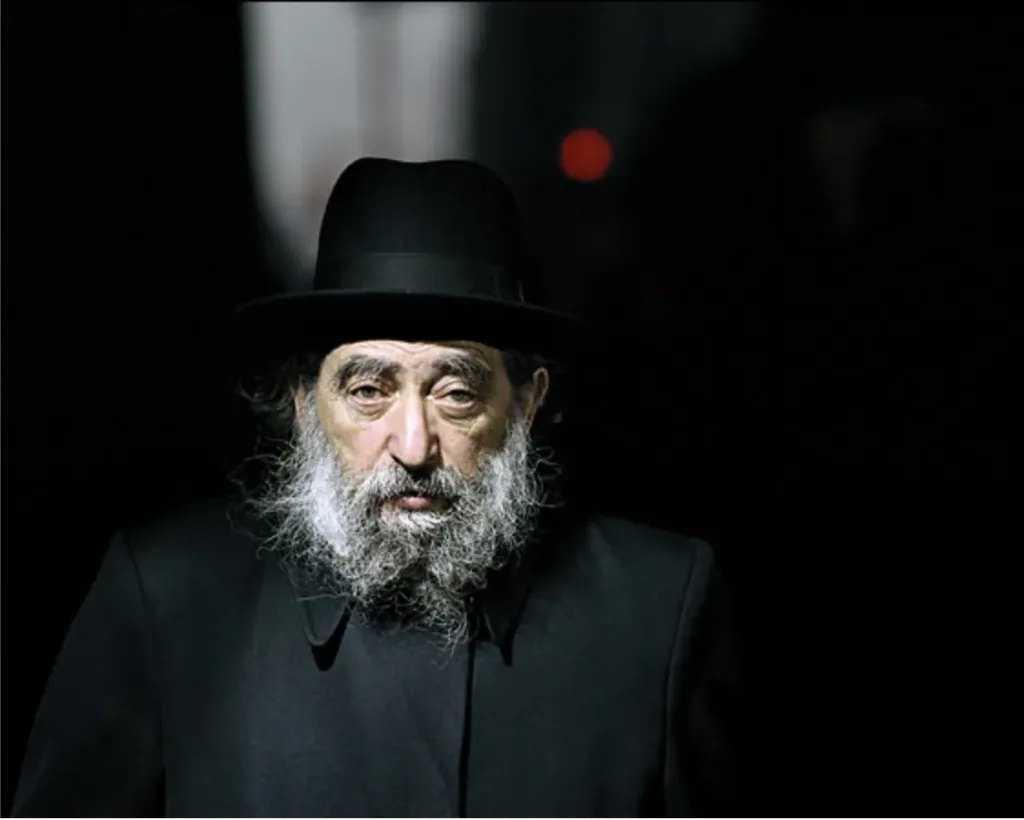
The 2000 image that led to the lawsuit.
Nussenzweig argued that the photograph violated his religious beliefs and privacy. However, the New York court sided with the photographer. The court held diCorcia’s work was protected as artistic expression under the First Amendment.
Aubry v. Éditions Vice-Versa (1998, Canada)
The Supreme Court of Canada came to a very different conclusion in this case involving Pascale Claude Aubry, a 17-year-old girl photographed without consent by artist Gilbert Duclos while sitting on public steps in Montreal. Though just like in the Nussenzweig v. diCorcia case, the disputed photo was also taken in a public place, the court ruled that publishing her image without consent violated her right to privacy, especially since she was a minor at the time the photo was taken.
The decision set a precedent in Canada requiring consent for publishing identifiable images taken in public, unless the photo was deemed newsworthy.
Why This Matters Now
Whether fictional or real, these cases reveal a deeper, ongoing tension between the photographer’s right to create and share their work, and the subject’s right to control how they’re portrayed. The conflict isn’t new, but the ethics behind it feel more urgent in today’s world of ubiquitous image sharing and social media, because behind every portrait, no matter how artistic, there’s a real person, and even if the law doesn’t demand it, that person deserves a voice in how they’re represented.
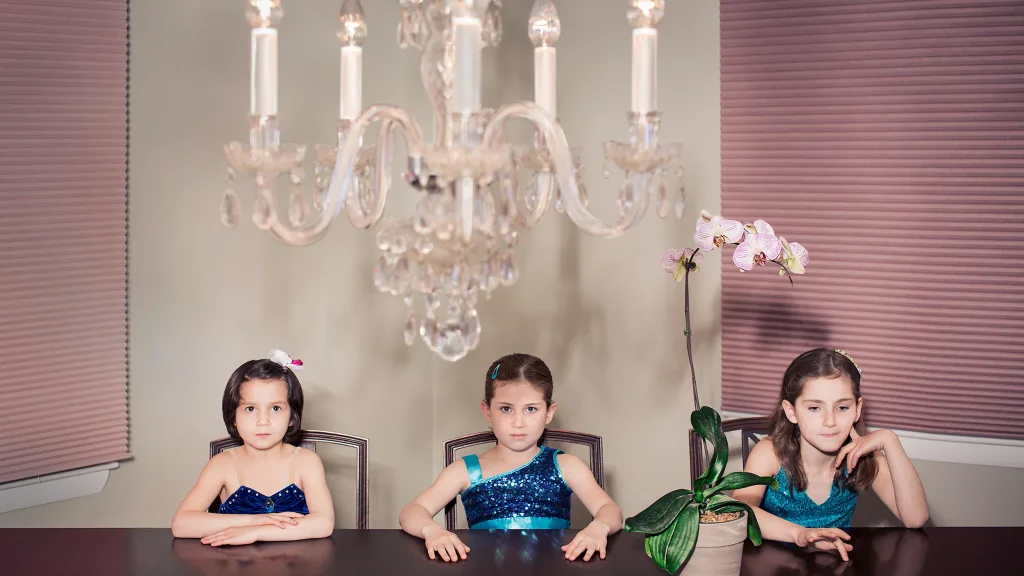
2012: A portrait of three sisters, published with both subject and parental consent.
When the subject of the photo does not have a choice, the result can echo the painful abuses of cases like that of Renty and Delia Taylor.
As for my sons, ironically, neither one has a social media presence, but both have permitted me to use select photos in my portfolio. And for that, I’m grateful, as the photos that I have taken of them throughout their childhood will forever represent our artistic collaboration, and their choice of the pictures are part of our lifelong artistic conversation.
So whether you’re planning a family photo session, senior portraits, or a creative collaborative engagement shoot, I believe every image should reflect who you are, and how you want to be seen.
Visit my portfolio to view recent work, or get in touch to start a conversation about your photography needs.
